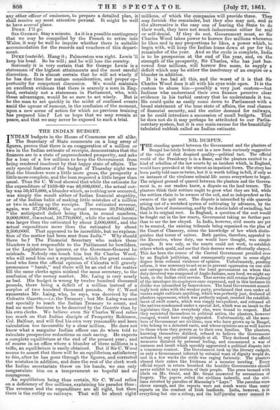lab INDIAN BUDGET.
TNDIAN budgets in the House of Commons are all alike. 1 The Secretary. of State comments on a long array of figures' proves that there is an exaggeration of a million or two in the Indian estimate of receipts, demonstrates that the finances are in a state of unprecedented prosperity, and asks for a loan of a few millions to keep the Government from being rendered insolvent by that happy state of affairs. The only special features of the budget of Thursday night were that the blunders were a little more gross, the prosperity a little more complete, and the loan required a little larger than usual. Thus Sir C. Wood showed that while the estimate for the expenditure of 1859-60 was 46,890,0001., the actual out- lay was 50,475,000, a blunder which, as nothing new occurred, was simply the result either of Indian financial stupidity, or of the Indian habit of making little mistakes of a million or two in adding up the receipts. The estimated revenue, again, was 37,796,0001., the actual revenue 39,780,000Z., "the anticipated deficit being thus, in round numbers, 9,000,0001., the actual, 10,770,0001., while the actual income was larger than the estimated by about 2,000,0001., and the actual expenditure more than the estimated by about 3,500,000/. That appeared to be incredible, but no explana- tion of the matter had been sent from India." Why should there be ? The Financial Secretary who makes these blunders is not responsible to the Parliament he bewilders, or the Legislature he ignores, or the Governor-General he misleads. Nobody can touch him but Sir Charles Wood, who will send him out a reprimand, which the great cousin- hood who form the official opinion of Calcutta will gravely pronounce "harsh," and there will be an end of the matter till the same clerks again mislead the same secretary, to the confusion of the money market. Mr.- Laing is very nearly as bad. H i His budget s wrong by twelve hundred thousand pounds, there being a deficit of a million instead of a surplus of two hundred thousand pounds. Sir C. Wood exonerates Mr. Laing, who, he says, was deceived by the Cakutta Gazette,—i.e. the Treasury ; but Mr. Laing was sent out specially to teach the Indian Treasury to count, and had no more business to be deceived by the Gazette than by his own clerks. We believe even Sir Charles Wood relies too much on that Indian disciple of Prosperity Robinson, Col. Balfour, and will find his own very reasonable and keen calculation too favourable by a clear million. He does not know what a sanguine Indian officer can do when told to calculate prospective reductions as cash saving. He expects a complete equilibrium at the end of the present year; and of course in an office where a blunder of three millions is a trifle, an equilibrium is easily obtained. But if Sir C. Wood means to assert that there will be an equilibrium satisfactory to him, after he has gone through the figures, and corrected the mistakes in addition, and dope the rest of the clerk work the Indian secretariats throw on his hands, we can only congratulate him on a temperament so hopeful and so courageous.
An equilibrium being thus certain, Sir C. Wood relies on a deficiency of five millions, explaining his paradox thus : The revenue and the expenditure are all right, but then there is the outlay on railways. That will be about eight millions, of which the companies will provide three. They may furnish ' the remainder, but they also may pot, and as the alternative is the easy one of leaving the State to do their work, they have not much inducement either for zeal or self-denial. If they do not, Government must, so Sir Charles Wood takes power to borrow five millions whenever he likes and in any proportions he likes, a power which, to begin with, will keep the Indian loans down at par for the remainder of the year. And so the cycle is complete, India is to be prosperous at the end of the year, and, on the strength of the prosperity, Sir Charles, who has just bor- rowed four millions, will borrow five more, to supply a deficit which may be either the insolvency of an empire or a blunder in addition.
It is too, bad all this, and the worst of it is that Sir Charles Wood does it all with his eyes wide open. It is the custom to abuse him—possibly a very just custom—but Indians who understand their own finance perceive clear evidence in his turbid oratory that he understands it too. He could quite as easily come down to Parliament with a broad statement of the true state of affairs, the real chance of financial security, and the entire demand for railways, as he could introduce a succession of small budgets. That he does not do it may perhaps be attributed to our Parlia- mentary system, but it is one main excuse for the beautifully tabulated rubbish called an Indian estimate.






























 Previous page
Previous page